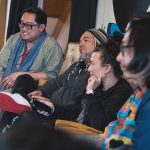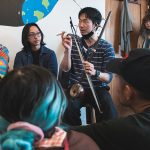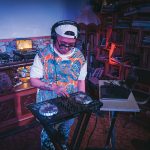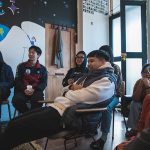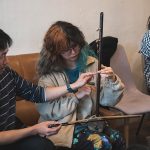Dude, Where The Asians At?
Dude, Where The Asians At?
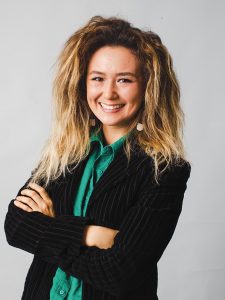
Danielle Hao-Aickin
‘Why don’t you write songs in Chinese?’
At the age of 21, I was posed with this challenging question that I found myself suddenly unable to answer. Stammering and stuttering, I grasped desperately at different excuses but ultimately couldn’t find a real justification… and this question started to burn me a little more as each day passed. It boiled and blistered until I couldn’t help but face myself with… ‘Why DON’T I write songs in my mother tongue?’
Is it the perpetual need to fit in with my peers by adopting Western normalisations of life? Maybe the discomfort of standing out, and not fitting into the standardised pop genre of music? Or perhaps it was a deep-rooted shame of being deemed ‘Asian’ that comes in a loaded package of negative connotations.
The answer was D: All Of The Above. And once that door was opened, more and more questions started emerging not just within myself, but in our entire sector of Asian creatives. Initiatives were born, communities were made, and an overarching question stood out in the industry against all the noise: ‘Dude, where the Asians at?’
I was not the first person to find an issue in our lack of Asian diversity in the creative industry. Many had come before to create movements such as The Oryza Foundation for Asian Performing Arts, Eastern Sound Collective, Pan-Asian Screen Collective, Proudly Asian Theatre and others. Many had already identified a giant gap that needed to be filled with poetical 包 (bao) buns and musical 饺子 (dumplings). We were not original, but rather an echo of a greater movement that had started emerging already. However, this was the first time I felt like I could grow alongside a community.
Where The Asians At?! Aotearoa (WTAA?!) started as a Facebook group during the Covid lockdown in 2021. Co-founded by Yee Yang ‘Square’ Lee, Sums Selvarajan, Eric Ngan, and myself (Danielle Hao-Aickin 郝丹丹), initially, it was about inviting all the Asian musicians we knew and seeing if we can count them on two hands (in some cases, we could).
We then started having online ‘Boba sessions’ amongst all the chaos of our world, gathering virtually and talking about pressing issues like representation. These sessions were sometimes about meeting new people, learning about the industry, discovering a universe called NFTs (for some reason), and finding solace in each other while being stuck at home.
Funnily, many Asian musicians we engaged hadn’t noticed a lack of representation at first, but once the conversation started, had moments of realisation – there had always been an underlying feeling of discomfort, and it had finally been identified. ‘OMG, that’s why I never felt like I fit in!’ Ironically, I found myself feeling more connected than I was before the pandemic. And as I started to see more badass representation around me, I began to grow in appreciation for my Chinese heritage like I had never experienced before. What was this emotion that I was feeling… Joy? Inspiration? Pride? Again, maybe all of the aAbove.
These virtual conversations made us all passionate for change, and Square, the master of it all, started to bring this conversation higher in the food chain. WTAA?! started getting recognition as a real vehicle of the community, and we got funding from the Ministry of Business, Innovation and Employment (MBIE) Local Activation Programme Fund in Tāmaki Makaurau to put on a mini Asian street performer festival in July 2022, which was named Asian(Sound)Scapes.
Held at Potters Park on Dominion Road (where else for an Asian event?), this mini-festival had a shocking six-week production period. Rushed, but amazed, we ended up engaging over 130+ Asian musicians to be part of the performance aspect, including Hindustani music, karaoke station, a full-on street dance battle curated by Street Talk NZ, and even a 30-piece traditional Chinese orchestra from the NZ Blossom Art Troupe (新西兰百花艺术团). For Asian musicians to be celebrated in this way had been something I hadn’t seen in Aotearoa before.
As Square puts it, “The joy of being able to discover Pan-Asian artists that haven’t really been visible beforehand,” was a key reward in organising this festival. As amazing as the festival was though, a shadow had been darkening over our kaupapa that was beginning to be of concern – we had the support, but numbers in attendance were not as we hoped.
After this event, a whole bouquet of initiatives blossomed in inspiration. The Music Producers Guild of New Zealand (MPGNZ) then supported Filipino-Australian music producer Kuya James to partake in a week-long artist residency at MoveSpace, where four Asian artists were able to work in a one-on-one capacity to learn from the legendary musician. James also led a one-day producer masterclass, mentoring over 10 Asian music producers in Tāmaki – which in itself was an enormous feat considering the WTAA?! whānau could only name four Asian music producers at the start of our community engagement!
Later in 2022 WTAA?! then branched off to support individual artists to tour. Named the Wāhine Asian Are Here Tour (WAAHT, because we love our acronyms) in collaboration with Eastern Sound Collective and Peach Promotions in Wellington, four female and non-binary identifying artists took the kaupapa around the North Island to Te Whanganui-a-Tara, Whanganui, and finally Tāmaki Makaurau.
The artists; Reshma Martin, Ersha Island 二沙岛, Nadia Freeman (Miss Leading), and Abbey Gamit (DJ RNG+sus) were able to come together and road trip together in celebration of BIPOC, female, and LGBTQ+ art, a combination so powerful that mainstream media clearly can only stomach so much of. In saying this, the turnout for each gig was much to be expected, both in the aftermath of Covid as well as a confronting kaupapa… meagre.
Another huge obstacle for many BIPOC artists is gaining support in who we stand for in principle, but not having the ticket sales or streaming numbers to show for it. The experience of these gigs was empowering but also sparked recurring questions for the team – who are we serving? Where is our audience? If a talented Asian artist performs on a stage but no one is there to hear it, do they really perform at all? Damn. Can’t answer this one, so let’s move on.
Next up, Asians In Music (AIM) was created by the awesome Mia Caintic and Clarissa Chai. They lead a programme called Sandbox that was designed to identify eight unsigned artists and afford them an opportunity to go through the stages of the song release process. From co-writing the song with a mentor, then going into the studio with a producer, Sandbox also held a showcase of these emerging artists early 2023 where they were able to perform their songs alongside the mentors. At this showcase, I was surprised at how many Asian musicians I didn’t know beforehand. It was an overwhelming sense of community that I felt suddenly so comfortable in – and as a Wasian (half Asian half Pākeha) myself, I had always struggled with calling myself Asian, and being proud of it.
These are amazing steps so far, but there’s a few of you that wouldn’t have known about these events if I hadn’t mentioned it. We, as Asians, are change-makers but we lay low, slowly gnawing away at a system that oppresses us and makes it so, so hard to be visible. But we are here – the question has never ever been whether we exist.
With WTAA?! I can now name over 100 amazing Asians musicians, and I still discover more names every day. The real question has always been why aren’t we supporting them? Like ‘really supporting them’?
So with even more questions than I started with, everything that’s happened so far has been to answer a confrontation that I couldn’t three years ago. Honestly? I still struggle to see a lot of Asian representation in mainstream NZ media, and I still gravitate to the nearest (and oftentimes only other) BIPOC person in a room full of industry members. But we’re trying very hard – whether that’s the Foundation North x Creative New Zealand Asian Artists Fund or the newly announced NZOA NewMusic Pan-Asian grant, it’s clear that this question is starting to burn on more than just my own slightly-olive skin.
Good. We expected to ruffle some feathers when we started this line of questioning.
So where ARE the Asians at? Maybe it’s in MasterChef NZ, where there had just been one of the first Chinese winners in Aotearoa this past couple years. Perhaps it’s in the Creative Director of Auckland Pride, or as The First Prime-Time Asian Sitcom. What if it’s in the creator and editor of an underground magazine designed to showcase emerging creatives, or hiding humbly and quietly behind a vintage guitar on stage with some big names? How about as one of only four established Asian music producers nationwide, or as the only representation in a whole educational institute?
Regardless of where we are, we won’t be stopping until the answer is D. All, and more, of the above.
NZ On Air New Music Pan-Asian Fund
On April 20, NZ On Air announced the introduction of a one-off targeted fund called the New Music Pan-Asian Fund. Created due to the lack of equitable representation of Pan-Asian artists in the music sector, it is designed to increase the amount of quality Pan-Asian music content available in Aotearoa, and to support the artists to better connect with both Pan-Asian and mainstream audiences..
Since 2020 NZ On Air have produced a Music Diversity Report which has shown Pan-Asian NZ musicians are under-represented in the Aotearoa music sector and in applications for funding, particularly in applicants to the New Music Project fund. Fittingly the one-off new fund applications will be open during May, NZ Music Month.
Consultations were held with Pan-Asian representatives of the music community to ensure there was a clear understanding of the challenges for that community and how funding would help.
NZ On Air has successfully invested in Pan-Asian screen development and production initiatives previously with the Pan-Asian Screen Collective (PASC), to provide targeted investment to strengthen Pan-Asian participation in the screen sector.
“That initiative successfully boosted the technical and business capability of Pan-Asian creatives in the screen space,” says NZ On Air Head of Music, Teresa Patterson. “NZ On Air’s commitment to improving Pan-Asian representation is now something we would like to build on in the music sector.”
New Music Pan-Asian is a single-track funding scheme which will provide up to $10,000 funding to musicians in Aotearoa who self-identify as Pan-Asian. Pan-Asian, as defined by the UN, covers all of Asia as well as the Middle East. Unlike NewMusic Single applications, there are no minimum criteria required to apply.
- abbey gamit
- aim
- asian soundscapes
- asians in music
- auckland pride
- clarissa chai
- creative nz
- danielle hao-aickin
- dj rng+sus
- eastern sound collective
- eric ngan
- ersha island
- foundation north
- mia caintic
- ministry of business innovation and employment
- miss leading
- movespace
- music producers guild of nz
- nadia freeman
- newmusic pan-asian
- newmusic single
- nz blossom art troupe
- nz on air
- nz on air music
- oryza doundation for asian performing arts
- pan-asian screen collective
- peach promotions
- potters park
- proudly asian theatre
- reshma martin
- sandbox
- street talk nz
- sums selvarajan
- teresa patterson
- wāhine asian are here
- where the asians at?!
- wtaa
- yee yang lee

